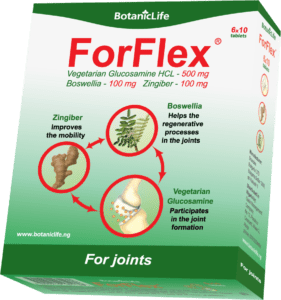⏰ Last Update: 15.08.2024
Arthritis, a condition marked by inflammation in the joints, can be a challenging hurdle, often resulting in discomfort, pain, and restricted mobility. This comprehensive guide aims to shed light on arthritis, its causes, symptoms, and potential treatments, with a special focus on natural alternatives for relief.
What is Arthritis?
Arthritis is a common health condition characterized by inflammation and stiffness in one or more joints, leading to varying degrees of discomfort and pain. It isn’t a single disease but rather an umbrella term encompassing over 100 types, including osteoarthritis, rheumatoid arthritis, and psoriatic arthritis, among others.
Causes of Arthritis
Arthritis develops when the cartilage, the firm tissue that cushions joints, wears down or is attacked by the body’s immune system. The causes vary depending on the specific type. Factors like age, sex, genetics, and lifestyle can increase one’s risk of developing the condition. Infections, injuries, and occupations involving repetitive movements can also contribute to its onset.
Risk Factors
The development of the condition can be influenced by a number of risk factors. While some of these are out of our control, others are lifestyle-oriented and can be modified to reduce the risk. Here’s a closer look at these factors:
Age
As with many health conditions, the risk of development, particularly osteoarthritis and rheumatoid arthritis, increases with age. The cumulative wear and tear or potential autoimmune triggers can be factors in this increased risk.
Gender
Certain types, such as rheumatoid arthritis, are more prevalent in women. However, gout, another type of arthritis, is more commonly seen in men.
Genetic Factors
Some people are born with specific genes that make them more susceptible to certain types like rheumatoid arthritis and ankylosing spondylitis. If you have family members with arthritis, you may be at a higher risk of developing the condition yourself.
Obesity
Carrying excess weight can put additional stress on joints, particularly those in the knees, hips, and spine, contributing to the development.
Joint Injuries
Individuals who have had injuries to joints, such as from sports or accidents, may be at a higher risk of developing arthritis in those joints later on.
Occupation
Certain professions that involve repetitive movements or heavy lifting can stress particular joints and potentially lead to the onset over time.
Infections
Certain infections can trigger the onset of various forms of arthritis. For instance, Lyme disease can eventually lead to a form of arthritis if not treated properly.
Smoking
Smoking tobacco not only affects the lungs but can also lead to the development of rheumatoid arthritis, particularly in those who have a genetic predisposition to this type.
Understanding these risk factors can be the first step towards a more proactive approach in managing your joint health. Even with predisposing factors, preventative strategies and proper care can slow the onset or progression of the condition.
Supplements like ForFlex, which harness the power of natural ingredients like glucosamine hydrochloride, boswellia, and ginger extracts, can play a beneficial role in maintaining joint health.
Symptoms of Arthritis
Symptoms can manifest in a multitude of ways and will often vary depending on the specific type of arthritis an individual has. However, there are certain common symptoms that many people with arthritis will experience.
Joint Pain
This is the most common and often the first symptom to appear. The severity can range from a dull ache to a sharp, intense pain. It may occur during movement or even while at rest. The pain is caused by inflammation within the joint or the wearing away of the joint’s cartilage.
Stiffness
Stiffness in the joints, particularly upon waking up in the morning or after periods of inactivity, is another common symptom. It can make movement difficult and uncomfortable.
Swelling
Some types of arthritis can cause the joint to swell and become inflamed. The skin over the joint may appear red and feel warm to touch. This is a result of the body’s immune response and increased blood flow to the area.
Decreased Range of Motion
The stiffness and pain may lead to a decreased range of motion in the affected joint. This can hinder day-to-day activities and affect quality of life. Over time, the joint may lose its normal shape and function.
Visible Changes
In advanced stages of some types the condition, like rheumatoid arthritis or osteoarthritis, visible changes can occur in the joints. This can include deformities or protrusions, such as nodes or lumps in the hands and fingers.
Systemic Symptoms
Some types of the condition, such as rheumatoid arthritis, are systemic, meaning they affect the whole body. This can lead to symptoms like fatigue, weight loss, and even fever.
Symptoms can fluctuate, with periods of intensity known as ‘flares’ followed by periods of relative relief known as ‘remission’. They can be mild, moderate, or severe, and may come and go over time. It is essential to seek medical advice if persistent symptoms are experienced, as untreated arthritis can eventually result in irreversible joint damage and deformities.
Complications of Arthritis
Arthritis, if left untreated, can lead to a range of complications affecting not just the joints, but potentially other parts of the body as well. Below are some of the key complications associated with arthritis:
Joint Damage and Deformity
Persistent inflammation can cause erosion of the joint cartilage and underlying bone. Over time, this can lead to changes in the shape and structure of the joint, resulting in deformities. This is often seen in conditions like rheumatoid arthritis and osteoarthritis.
Reduced Mobility and Disability
Chronic pain, stiffness, and reduced joint function can make everyday activities challenging and lead to decreased mobility. In severe cases, this can result in disability.
Weakness and Muscle Wasting
The discomfort may lead to reduced physical activity, which can result in muscle weakness and atrophy over time.
Systemic Complications
Certain types of the condition, like rheumatoid arthritis, are systemic diseases and can affect various organ systems, leading to cardiovascular diseases, lung diseases, or eye inflammation.
Psychological Issues
Living with chronic pain and disability can have a substantial impact on mental health, leading to issues such as anxiety, depression, and lowered self-esteem.
Lower Quality of Life
Combined, these complications can significantly impact the quality of life, affecting not just physical health but mental and emotional well-being as well.
Early diagnosis and comprehensive management of arthritis are essential to minimize these complications. Consider the addition of a natural supplement like ForFlex. It contains glucosamine hydrochloride, boswellia, and ginger extracts known to support joint health and function, which can help manage arthritis symptoms and potentially slow disease progression: https://botaniclife.ng/product/forflex/
Diagnosing Arthritis
Diagnosing arthritis involves a thorough evaluation that starts with a detailed medical history and physical examination. Your doctor will ask about your symptoms and perform a physical examination to check for signs like joint swelling, redness, warmth, and limited motion.
Next, they may suggest laboratory tests. Blood tests can identify markers of inflammation, autoantibodies (in cases of autoimmune arthritis like rheumatoid arthritis), or uric acid levels (for gout).
Additionally, joint fluid analysis can help determine the type of arthritis you have. For this test, fluid is extracted from the affected joint with a needle and examined in a laboratory.
Imaging studies, such as X-rays, can reveal changes in the joints that occur in different types of arthritis. Advanced imaging techniques like computed tomography (CT), magnetic resonance imaging (MRI), or ultrasound can provide a more detailed view of the joints and surrounding tissues.
Treatment
Arthritis treatment primarily aims to control pain, minimize joint damage, and improve or maintain function and quality of life. Approaches to arthritis treatment typically include:
Medications
These can vary depending on the type of arthritis. Commonly used drugs include nonsteroidal anti-inflammatory drugs (NSAIDs), corticosteroids, analgesics, and disease-modifying antirheumatic drugs (DMARDs).
Physical Therapy
Physical therapy can help strengthen the muscles around the affected joint and maintain joint flexibility.
Lifestyle Changes
Healthy diet, regular exercise, adequate rest, and weight management can help reduce symptoms and prevent further joint damage.
Surgery
In severe cases, procedures like joint replacement or joint fusion may be necessary.
While these treatments can be effective, long-term use of some medications, especially painkillers, can lead to side effects such as gastrointestinal disturbances, dependency, and increased cardiovascular risks.
This is why many people with arthritis are turning to natural alternatives like ForFlex. Formulated with glucosamine hydrochloride, and extracts of boswellia and ginger, ForFlex supports joint health and function, offering a natural approach to managing arthritis symptoms and improving the quality of life. These natural ingredients are known for their anti-inflammatory properties and ability to help slow cartilage degradation, making ForFlex a valuable addition to an overall arthritis management plan.
ForFlex
ForFlex is a high-quality natural supplement formulated to support joint health and alleviate arthritis symptoms. It contains glucosamine hydrochloride and potent extracts from boswellia and ginger, all known for their powerful anti-inflammatory and joint-protective properties.
Glucosamine hydrochloride helps maintain joint health by promoting the repair and growth of cartilage, the cushioning tissue in joints. Boswellia extract, derived from the Boswellia serrata tree, has strong anti-inflammatory properties that help reduce pain and inflammation. Ginger extract also packs a powerful anti-inflammatory punch and helps reduce joint pain and stiffness.
ForFlex offers numerous benefits, especially for those suffering from arthritis. Its natural ingredients support joint health, promote cartilage repair, reduce inflammation, and alleviate joint pain. By incorporating ForFlex into your daily regimen, you can proactively manage arthritis symptoms and promote overall joint health.
You can find ForFlex in pharmacies without a prescription or purchase it online through the link: https://botaniclife.ng/product/forflex/
Conclusion
In conclusion, arthritis is a prevalent condition that affects millions of people worldwide. It’s characterized by joint pain, inflammation, and stiffness, which can significantly impair quality of life. Multiple factors contribute to its onset, including age, gender, genetics, previous injuries, and certain lifestyle factors.
While arthritis symptoms can be daunting and, in some cases, progressively debilitating, it’s important to remember that numerous effective strategies exist for managing the condition. These range from conventional treatments like medications and physical therapy to natural supplements like ForFlex. Incorporating a holistic approach that combines a healthy lifestyle, physical activity, medical treatments, and natural supplements can contribute significantly to reducing arthritis symptoms and enhancing overall wellbeing.
ForFlex, with its blend of glucosamine hydrochloride, boswellia, and ginger extracts, is an excellent natural option for supporting joint health. These ingredients are recognized for their anti-inflammatory properties and potential to slow down cartilage degradation, providing a natural pathway to ease arthritis symptoms.
Learn more about ForFlex!





